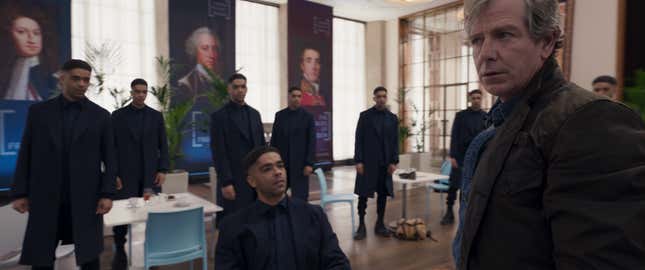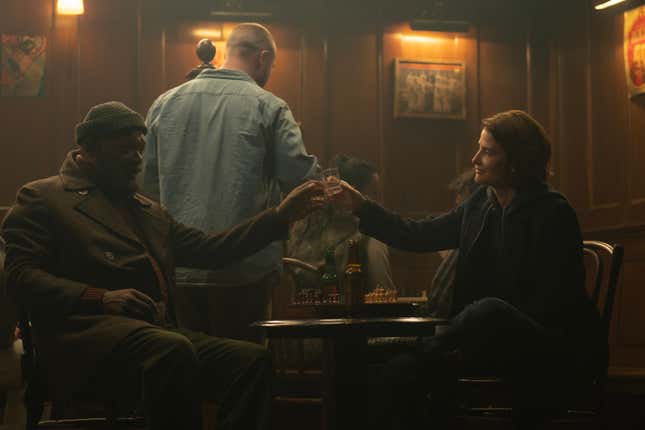In what can only described as one of the most bizarre interviews I’ve read recently, Secret Invasion director Ali Selim spoke to Variety in the wake of the Marvel show’s finale. The questions spanned the abbreviated runtimes, how much of the scripts he was allowed to change, and, most importantly, what he thinks about the mixed reviews.
The response is… well, he’s trying to be polite and also attempting to respect that the show is made for the audience, not necessarily for critics. But in today’s critical environment, where anyone’s hot take about a television series can become the most vocal review out there, the double talk about reviewers vs. the audience rings hollow.
When asked about the reviews, Selim said. “I don’t read reviews. With all due respect. For me, I view all the storytelling work I do as a dialogue with an audience. When the show is finished and put up on the screen, that’s my half of the dialogue. And the audience then starts their half of the response to it. I think that’s valuable, but I don’t know how to answer the question.”
There’s a part of this that makes sense, and which I agree with—art is for the audience. Reviews are likewise for the audience. Reviewers are, however, part of the audience. Most people—myself included—who watched Secret Invasion did so with genuine interest, with real excitement! io9 stalwarts might know that I have little love to spare for Marvel, but I thought that there was really something here worth exploring, and that maybe with a more grounded director at the helm and a less superhero-oriented vision, the show could have been an exploration of power, age, responsibility, and what politics are at play within a world that has, for the most part, been subject to the whims of super-powered alien assholes.
And then, Selim says what I think is probably the most perplexing and double-think part of this interview. After just saying that the show is in dialogue with the audience, and that reviews don’t matter, he then says, “Marvel has a very devoted—even rabid—fan base who have expectations and when their expectations aren’t fulfilled, they move in the other direction; they give it a thumbs down.”
Which is just… kind of an odd thing to say after literally just saying that the show is in dialogue with the audience. He expands on this, mentioning that it might not be his job “to fulfill [the audience’s] expectations,” implying that it’s more likely his job is to just “tell the story we’re telling.”
That might be true if you’re working on an independent project, but this is Marvel. You aren’t necessarily just telling the story you want to tell—you’re telling a story that’s part of a greater whole, sliding into a machine shaped by not just Marvel fans’ expectations, but Kevin Feige and other creators with their own cogs in the machine. This isn’t a show that can stand on its own—it’s fundamentally not supposed to. It’s part of the Marvel Cinematic Universe and it will be judged on metrics most shows never think twice about.

Throughout the interview the whole vibe of Selim’s answers is just that Secret Invasion is what it is, and he’s happy with it. Which is fine, really, but the responses he gives show how Selim has fundamentally missed opportunities to not only make a show that would have resonated better with Marvel fans, but with audiences in general. His view of action sequences is, in particular, baffling.
“When you get to a heavily choreographed fight scene or bombing sequence or an ambush sequence, it’s just kind of fun, right?” He said. “But [fight scenes aren’t] as emotionally significant or emotionally resonant as the quiet moment in episode five where [G’iah] and Nick Fury discussed Talos’ death.”
If he’s basically saying that a heavily choreographed fight sequence doesn’t give him room to explore emotions then what is the point of having that fight sequence at all? It makes no sense! It’s not just disrespectful to the performers who do these stunts and fights, it’s also a fundamental misunderstanding of what makes a good action sequence—and how they can tell a story and give insight into a character just as vitally as a dialogue sequence can.
When asked about runtimes (the show starts out at about 40 minutes per episode and gets shorter as the season continues), Selim seems to have an efficiency to his artistry. “It’s written one way; actors start performing it and it becomes something slightly different; and when you start filming the performances, it becomes something slightly different; and then when you go to edit it, you realign yourself.”
He explains his process of cuts, and then says, “And there’s also some sense of ramping up to an explosive ending—which to my mind means you go faster, not bigger and bloatier.”
I think it’s this response that truly drives me up a wall. Going faster means that not only does the audience not have time to breathe but the characters suffer from space as well. The scenes that were so good in the first part of this series—the slower scenes with Fury and Talos, Fury and Maria, occasionally even between Fury and Priscilla—never show up in the later half. G’iah does not mourn her father, Fury does not mourn his marriage, Falsworth does not plan and seethe in her office. Instead of rising tension via “emotional resonance” we simply get action after action, a frenetic movement towards an “explosive ending” where the ending is just a preset cage match without any demonstration of the idealogical and political struggles between G’iah and Gravik, because those underlying frequencies have been dampened in a rush to get to the wirework. Wirework that Selim admittedly doesn’t seem to care about as a storytelling device! What is even the point?

The whole interview just feels like a fundamental misinterpretation of how to work on a Marvel property without getting lost in the sauce of Marvel-ness and Marvel weirdness. There was so much that could have been done, could have been considered, and Selim just comes off as being disinterested. So far, Secret Invasion has not been renewed for season two. But that could change.
All six episodes of Secret Invasion are available to stream on Disney+.
This piece was written during the 2023 WGA and SAG-AFTRA strikes. Without the labor of the writers and actors currently on strike, the television show being covered here wouldn’t exist.
Want more io9 news? Check out when to expect the latest Marvel, Star Wars, and Star Trek releases, what’s next for the DC Universe on film and TV, and everything you need to know about the future of Doctor Who.

